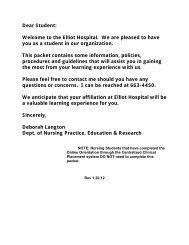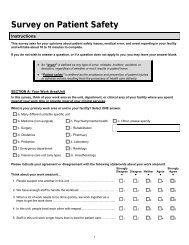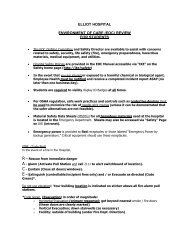Intermittent Headaches in Children - Elliot Hospital
Intermittent Headaches in Children - Elliot Hospital
Intermittent Headaches in Children - Elliot Hospital
Create successful ePaper yourself
Turn your PDF publications into a flip-book with our unique Google optimized e-Paper software.
<strong>Intermittent</strong><br />
HEADACHES<br />
<strong>in</strong> <strong>Children</strong><br />
By: Suzanne Bowden, APRN, <strong>Elliot</strong> Pediatric Neurology, New Hampshire's <strong>Hospital</strong> for <strong>Children</strong><br />
<strong>Headaches</strong> are one of the most common compla<strong>in</strong>ts dur<strong>in</strong>g<br />
childhood. Although most times headaches are not caused<br />
by any serious illness, they can cause great distress to both<br />
children and their parents.<br />
Most Common Types of Headache<br />
Tension Headache: This is the most common type headache <strong>in</strong><br />
childhood and adolescence. These headaches can last from 30<br />
m<strong>in</strong>utes to several days. These headaches will beg<strong>in</strong> gradually, and<br />
worsen throughout the day. Your child may compla<strong>in</strong> of pa<strong>in</strong><br />
around the whole head. These headaches are often<br />
described as press<strong>in</strong>g or tighten<strong>in</strong>g. Possible<br />
triggers <strong>in</strong>clude stress, eye stra<strong>in</strong> and<br />
poor posture. Ibuprofen and<br />
Acetam<strong>in</strong>ophen are usually<br />
effective <strong>in</strong> treat<strong>in</strong>g tension<br />
headaches.<br />
Migra<strong>in</strong>e Headache:<br />
This type of<br />
headache <strong>in</strong>volves<br />
the nerves and<br />
blood vessels of<br />
the bra<strong>in</strong>. The<br />
blood vessels<br />
first constrict,<br />
or get smaller<br />
decreas<strong>in</strong>g the<br />
amount of<br />
oxygen to the<br />
bra<strong>in</strong>. This<br />
then causes the<br />
vessels to expand.<br />
When the blood vessels<br />
expand, they become<br />
<strong>in</strong>flamed, and cause<br />
throbb<strong>in</strong>g pound<strong>in</strong>g pa<strong>in</strong>.<br />
Migra<strong>in</strong>e often runs <strong>in</strong><br />
families. In the adult<br />
population, migra<strong>in</strong>es are<br />
typically one sided severe<br />
headaches that can last<br />
Any severe headache<br />
of sudden onset or<br />
progressively worsen<strong>in</strong>g<br />
non remitt<strong>in</strong>g headache<br />
requires urgent attention<br />
and should be evaluated<br />
immediately by<br />
your physician.<br />
anywhere from 4 to 24 hours. Migra<strong>in</strong>es <strong>in</strong> children are usually<br />
felt <strong>in</strong> their forehead. The pa<strong>in</strong> of migra<strong>in</strong>e is usually<br />
moderate to severe. Migra<strong>in</strong>e <strong>in</strong> children can last<br />
anywhere from 1 hour to 72 hours. Like<br />
adult migra<strong>in</strong>e, Pediatric migra<strong>in</strong>e is<br />
often associated with nausea,<br />
vomit<strong>in</strong>g and light sensitivity.<br />
Chronic Headache: Chronic<br />
headaches occur more than 15<br />
days out of the month. This<br />
headache pattern is rare <strong>in</strong><br />
children under age 12. This<br />
type of headache evolves<br />
from tension headaches. If<br />
you give Ibuprofen or<br />
Acetam<strong>in</strong>ophen more<br />
than 4 times a week, it<br />
can lead to chronic daily<br />
headache. Treat<strong>in</strong>g<br />
chronic headaches can be<br />
challeng<strong>in</strong>g, s<strong>in</strong>ce they<br />
can often have mixed<br />
features of different types<br />
of headaches.
Causes of Headache <strong>in</strong> <strong>Children</strong><br />
• Infection<br />
• Poor nutrition and food additives<br />
• Excessive caffe<strong>in</strong>e <strong>in</strong>take<br />
• Stress<br />
• Lack of Sleep<br />
• Heredity: migra<strong>in</strong>e, cluster headaches<br />
Headache Treatments<br />
Ibuprofen: is one of the most effective<br />
medications to treat headaches <strong>in</strong><br />
children. Ibuprofen is effective even for<br />
treat<strong>in</strong>g migra<strong>in</strong>e headaches. It should<br />
be given as soon as the headache beg<strong>in</strong>s,<br />
to ensure maximum benefit.<br />
Ibuprofen and Acetam<strong>in</strong>ophen should<br />
not be given more than 3 to 4 times a<br />
week for headaches. These medications<br />
can cause a rebound headache if they are<br />
given more frequently.<br />
Warm or cold compress: Many children f<strong>in</strong>d a<br />
warm or cold compress effective <strong>in</strong> reliev<strong>in</strong>g the pa<strong>in</strong><br />
of headache.<br />
Encourage fluids: Dehydration is a common cause of headaches.<br />
It is particularly important for a child who is prone to headaches<br />
to stay well hydrated.<br />
Rest: Allow<strong>in</strong>g the child to rest or sleep dur<strong>in</strong>g the headache <strong>in</strong><br />
conjunction with Ibuprofen and sleep may also be beneficial.<br />
Headache Prevention<br />
<strong>Headaches</strong> can often be well controlled us<strong>in</strong>g the follow<strong>in</strong>g<br />
preventative measures:<br />
Sleep: Sleep and headache have been shown to be closely l<strong>in</strong>ked.<br />
A regular sleep schedule is important for every child, especially for<br />
those children who are prone to headaches. Parents should<br />
establish regular bedtimes, and turn all electronic devices off at<br />
night.<br />
Nutrition: Is another important way to prevent headaches. Your<br />
child should have a good breakfast with a prote<strong>in</strong> source such as<br />
yogurt or peanut butter to start the day. <strong>Children</strong> who are prone<br />
to headaches should also eat a balanced lunch and d<strong>in</strong>ner along<br />
with healthy snack choices. A multivitam<strong>in</strong> taken daily can also be<br />
helpful. Vitam<strong>in</strong> B and Magnesium have been shown to be<br />
helpful <strong>in</strong> headache prevention.<br />
Contact the<br />
<strong>Elliot</strong> Pediatric<br />
Headache Cl<strong>in</strong>ic<br />
by call<strong>in</strong>g<br />
603-663-3222<br />
Adequate Fluids: Encourag<strong>in</strong>g adequate fluids are one of the<br />
most important ways you can prevent headaches. Have your child<br />
carry a water bottle and dr<strong>in</strong>k at least 2 liters of fluid a day. Avoid<br />
dr<strong>in</strong>ks with too much sugar such as Gatorade. Water is the<br />
best choice for hydration.<br />
Regular Exercise and Stress Reduction:<br />
Exercise improves circulation and<br />
oxygenation, as well as releas<strong>in</strong>g endorph<strong>in</strong>s<br />
to help with a general sense of well be<strong>in</strong>g.<br />
Methods of stress reduction <strong>in</strong>clude yoga,<br />
listen<strong>in</strong>g to calm quiet music and deep<br />
breath<strong>in</strong>g.<br />
When to See Your<br />
Practitioner<br />
There are times when your child’s<br />
headache does not respond to lifestyle<br />
and diet changes. If the headache occurs<br />
more than 3 times a week, and impacts the<br />
normal daily rout<strong>in</strong>e of the child, a<br />
preventative medication may be <strong>in</strong>dicated.<br />
There are many medications used <strong>in</strong> headache<br />
prevention. There are also herbal supplements such as<br />
Buterbur Extract that have been found to be quite effective for<br />
headache prevention. This is the time when you will need the<br />
guidance of your Pediatrician. They may decide to refer you to our<br />
cl<strong>in</strong>ic.<br />
At <strong>Elliot</strong> Pediatric Neurology, we believe <strong>in</strong> the “do no harm”<br />
approach to headaches. Parents can make the decision to visit our<br />
cl<strong>in</strong>ic with the guidance of the Primary Care Physician. A referral<br />
may be required. We will conduct a thorough history and<br />
determ<strong>in</strong>e the best options to treat headaches. We have a unique<br />
<strong>in</strong>tegrative approach to headache treatment. Our cl<strong>in</strong>icians stress<br />
the importance of rest, nutrition and sleep to help improve or<br />
prevent headache. We also choose treatments based on the child’s<br />
age, other associated symptoms, and headache pattern. <strong>Headaches</strong><br />
can be difficult to diagnose and treat <strong>in</strong> children. However, with<br />
the right tools and <strong>in</strong>terventions, a child’s headaches can be<br />
successfully managed to ensure the best quality of life possible.<br />
Our Cl<strong>in</strong>ic is located at:<br />
<strong>Elliot</strong> Pediatric Neurology<br />
A service of the New Hampshire’s <strong>Hospital</strong> for <strong>Children</strong><br />
275 Mammoth Road, Suite 1<br />
Manchester, NH 03109<br />
603-663-3222









